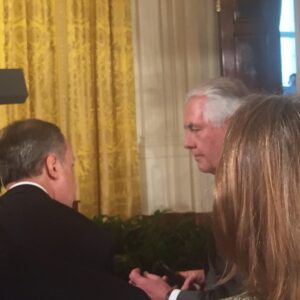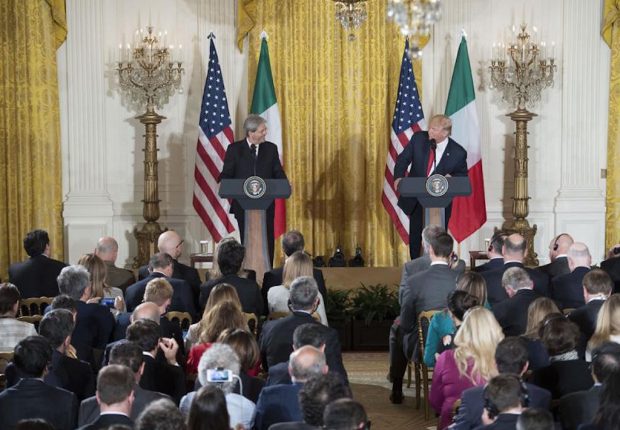On the surface, the visit of the Italian prime minister to the White House looked like it had gone great. Yes, President Donald Trump praised the country of Verdi and Pavarotti–the latter a great friend of his– for its culture and thousand-year-old history. But in reality, these representatives of the Italian government would go back to Italy with a validation of what had been suspected for a while now: when talking about stabilizing Libya, which is the top problem for Italian national interests and is tied to the refugee crisis – and to energy sources as well, – Italy can’t count on the US.
Let’s go back a couple of hours. The morning of Thursday, April 20th, at the Center for Strategic and International Studies of Washington, Gentiloni repeated what has been a mantra for all Italian governments that have come and gone at Palazzo Chigi in the last four years: Libya can’t go on in this chaotic manner, we need to stabilize it, instead of fragmenting it, and whoever thinks about dividing it is just making the situation even more dangerous. At the CSIS, the prime minister wished that the White House understood the message. With such an unstable Libya, we risk strengthening ISIS and leaving Europe without defenses on the refugee crisis in the North-African country where human traffickers pile up the export “goods.”
After the bilateral dialogue, at the beginning of the press conference in the East Room, Trump started speaking about Italy, extolling it as a country that has given so much to America, thanks to its “18 million Italian-Americans living in the United States.” It seemed that by manipulating the soft spot that President Trump ostensibly has for the “spectacular country that [he knows] really well,” Gentiloni convinced him to comply with what Italy cares about the most at the moment: getting the USA’s promise to help to stabilize Libya and contain the expansion of Islamic fundamentalist movements and Russian influence in the Mediterranean, both of which are now clear to anyone who is willing to see it.

When a journalist from Radio Rai had the chance to ask a question, Trump’s friendly face towards Italy became one of insult towards Gentiloni. Before the conference started, we learned from some embassy officials that it had already been established who would ask the questions: two from the American journalists and two from the Italian journalists. Not only were the number of questions already established, but also who would ask them. We didn’t understand how the four journalists had been chosen and whether the people who had chosen them knew what kind of questions they would be asking.
Prior to the questions, Trump loaded Italy with compliments: “We renew the deep ties of history and friendship that link together the American and the Italian peoples. That history traces its roots to the timeless contributions of Italy to civilization and human progress, stretching all the way back to Ancient Rome. Through the ages, your country has been a beacon of artistic and scientific achievement – and that continues today – from Venice to Florence, from Verdi to Pavarotti, a great friend of mine. These bonds of history and culture have only grown stronger as our two nations have become close partners, dear friends, and very vital allies.”
Gentiloni replied: “It was a productive meeting. It’s an honor to be here at the White House. Today, we renew a friendship and the common commitment against terrorism. We’ll be decisive in the stabilization process of Iraq after the military defeat of Daesh.”
Trump even praised Italy for being a trading partner that is on a “reciprocal” – repeating the word twice – relationship: “I love the word ‘reciprocal,’ because we don’t have too many reciprocal trading partnerships…”
The Summit of the two leaders was also influenced by the news coming from Paris at that same moment. “Our condolences from our country to the people of France. It looks like another terrorist attack. We have to be strong and we have to be vigilant,” said Trump. “I concur with President Trump’s words about what happened in Paris: condolences and closeness to the French people and government in this very delicate period for them, just three days before the elections,” commented Gentiloni.
The fight against terrorism is indeed at the heart of the talks between the two leaders. Gentiloni repeats what he said at the CSIS and defines the commitment as “fundamental”, indeed “even political,” of the USA to bring stability to Libya and to avoid the “division” of the country, which could be due to other countries’ influence as well. Trump recognizes Italy’s “leadership in seeking stabilization in Libya,” but when the Rai journalist asked Gentiloni what he expects from the USA in Libya, and Trump to what extent is the USA willing to be involved in the stabilization of Libya, that’s when Trump shocked Gentiloni and the entire Italian government delegation: “I do not see a role in Libya. I think the United States has enough roles right now.”
Was he saying it right then for the first time or had he already pre-announced it to Gentiloni one-on-one? Throughout the press conference, the Italian prime minister spoke clearly and precisely, but now he appeared fatigued and dejected to us Italian journalists sitting in the first row. It was just an impression, a sensation we had, not a certainty, but I believe that even Gentiloni felt embarrassed when the American president denied his assistance on Libya in such a public way. Especially after Gentiloni had asked for that help just a few moments before and in the CSIS’s speech in the morning.
And then, came an “accident” that should have mortified the prime minister, and that maybe – thankfully – he didn’t realize what all the journalists in the room had noticed. In fact, while Gentiloni kept on speaking, Trump, who took his earpiece out to listen to the question on Europe that had been asked before by another Italian journalist in English, did not put the earpiece back in for the final part of the conference. That means that when Gentiloni was speaking in Italian, Trump, who alternated a smile with a harsh and challenging look, didn’t understand a thing that the prime minister was saying. It wasn’t for long and, yes, it was just for the last few minutes of the press conference, but it wasn’t a pretty picture. It was embarrassing and, above all, in clear contrast with the warm welcome Trump had given Gentiloni – at least in words – at the beginning of the press conference.

According to the Agenzia ANSA – the Italian National Associated Press Agency – that we are reading while writing this article, some sources say that during the Summit in the Oval Office, the President of the United States asked some questions on Libya. In the final statement, he even says that Italy is indeed “a key partner in the fight against terrorism” and for “crucial efforts to deny ISIS a foothold in the Mediterranean.”
On his part, even Gentiloni got some things off his chest during the press conference. For instance, when answering the question of a colleague from Sky Italia, he stressed that Italy is not a military presence in Syria and it won’t be in the future. And, when Trump insisted that we should raise the NATO expenses to 2%, the Italian prime minister explained that Italy will do it progressively: “we made a commitment.” In 10 years, explains Gentiloni, our investments grew from 1.2 to 1.4%, spending 23.4 billion of Euros in 2014. But the prime minister meant to show that he intends to take his time: Italy will do it in its own time, not when Washington imposes it.

The Italian Ambassador in Washington Armando Varicchio (left) exchanges ideas with the US Secretary of State Rex Tillerson just a few moments before the press conference at the White House (VNY Photo).[/caption]
We witnessed the press conference from the first row, but we knew two hours before it started that we couldn’t even try to ask a question. The “chosen ones” were already designated. What a shame. We had a question ready for both Trump and Gentiloni, which was in theme with the bilateral dialogue. A question that was connected to the new foreign policies of the Trump administration and to our experience at the UN headquarters. The question we would have liked to ask was this: President Trump, Prime Minister Gentiloni, could you explain more clearly, what would be the consequences of the new “assertive” American foreign policy on the relationship between Italy and the United States? In her first day at the UN headquarters, the American Ambassador Nikki Haley explained to the journalists that the United States will keep a list of all the countries that don’t fulfill promises that they have made. Therefore, President Trump and Prime Minister Gentiloni, do you already know what Italy should do and should not do, in order to avoid ending up on “Trump’s list,” the list of all the undisciplined allies to punish?
P.S.:
Is it possible that someone from the White House staff, in charge of preparing Gentiloni’s file before his visit, might read this article on the internet?
Translated by Giulia Casati.












